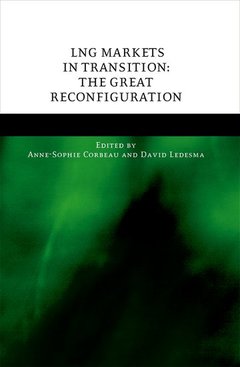Description
LNG Markets in Transition
The Great Reconfiguration
Coordinators: Corbeau Anne-Sophie, Ledesma David
Language: English
Subject for LNG Markets in Transition:
Publication date: 09-2016
560 p. · 16.6x24.4 cm · Hardback
560 p. · 16.6x24.4 cm · Hardback
Description
/li>Biography
/li>
The present situation in the LNG market should be seen as a 'crossroads' for the industry. The LNG industry has not been static over the past 5 decades and has already experienced many changes, but still the model of long-term contracts prevails and the majority of LNG is still bought at oil-indexed gas prices. There have however been considerable changes: an increase in short-term trading of LNG, buyer contractual flexibility and FOB contracts which have lead to around a quarter of the LNG is being traded under spot and short-term contracts, with aggregators play a far more significant role. All these factors have influenced project business structures. The industry has now embarked on a period of further change, with 180 bcm of new LNG export capacity (equivalent to more than 50% of LNG trade in 2014) under construction at a time when the assumed rapid LNG demand growth in Asia appears to be slowing. The absorption of this new supply will affect, not only trade-flow patterns, but also pricing dynamics, competition with other gas supply channels and (in the power sector) potentially other fuels. Key to this change is US LNG, with buyers becoming more selective about the price and delivery terms they are ready to accept. Sellers however are facing high costs and are reluctant to abandon a business model in which they have confidence. Oil indexation is under further attack with US LNG selling at HH indexed prices (plus costs), and other sellers and buyers have been pressured to adopt different pricing policies and secure more contractual flexibility. This volume examines the development of the LNG business over the past 50 years and examines how the industry will change over the coming 15 years, faced by unprecedented challenges to its historic business model.
Anne-Sophie Corbeau has been working in the energy industry for 15 years with a particular focus on the gas industry. She joined KAPSARC as research fellow in September 2014. Previously, she was senior gas expert at the International Energy Agency where she was responsible for managing the research on global gas markets, and in particular on short- to medium-term developments and energy security aspects. There, she developed a new annual publication - the Medium Term Gas Market Report. She has also worked at CERA as Associate Director in the European gas team, and has worked on fuel cells and hydrogen at Peugeot and Debis Systemhaus. Anne-Sophie holds an MSc from the Ecole Centrale Paris and an MSc from the University of Stuttgart. David Ledesma is an independent energy and strategy consultant specialising in LNG and gas. In his 32 years of experience in the energy and utility sector in Shell and other companies, he worked on the development of complex integrated energy projects, negotiations at government level, and the management of joint ventures. David is a Fellow of the Oxford Institute for Energy Studies and co-author of its books Natural Gas in Asia (2008). Mr Ledesma has also authored several papers for the Institute, including The Changing relationship between NOCs and IOCs in the LNG chain (2009), East Africa - Potential for Export (2013), and The Future of Australian LNG Exports: Will domestic challenges limit the development of future LNG export capacity? (2014).
© 2024 LAVOISIER S.A.S.




